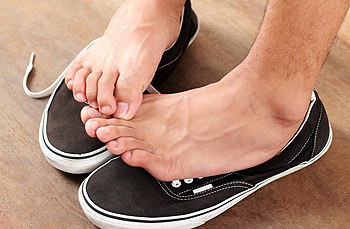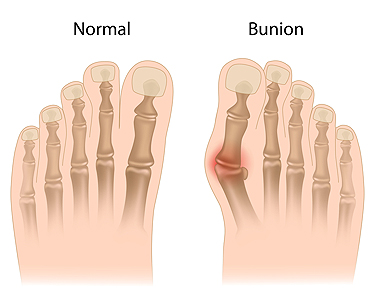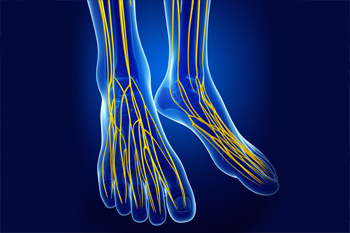Richfield (435) 896-6497
Ephraim (435) 283-4076
March 2021
How Obesity Affects a Child’s Feet
Childhood obesity can precipitate a host of childhood development and health issues, with foot pain being high on the list. A child carrying extra weight is more prone to developing flat feet, calf or arch pain, stress fractures, and problems with the heel such as plantar fasciitis, hairline fissures, and inflammation where the growth plate and Achilles tendon meet (Sever’s disease). Some children may have foot conditions they inherited or were born with, which can be exacerbated by excess weight. However, losing weight can be difficult for obese children because physical activity can make their foot pain worse, making regular exercise difficult or even impossible. A podiatrist may be able to help with orthotics and other strategies to relieve foot pain, correct alignment, and treat any underlying foot or ankle disorders.
Making sure that your children maintain good foot health is very important as they grow. If you have any questions, contact Dr. Blake Zobell of Utah. Our doctor can provide the care you need to keep you pain-free and on your feet.
Keeping Children's Feet Healthy
Having healthy feet during childhood can help prevent medical problems later in life, namely in the back and legs. As children grow, their feet require different types of care. Here are some things to consider...
Although babies do not walk yet, it is still very important to take care of their feet.
Avoid putting tight shoes or socks on his or her feet.
Allow the baby to stretch and kick his or her feet to feel comfortable.
As a toddler, kids are now on the move and begin to develop differently. At this age, toddlers are getting a feel for walking, so don’t be alarmed if your toddler is unsteady or ‘walks funny’.
As your child gets older, it is important to teach them how to take care of their feet.
Show them proper hygiene to prevent infections such as fungus.
Be watchful for any pain or injury.
Have all injuries checked by a doctor as soon as possible.
Comfortable, protective shoes should always be worn, especially at play.
If you have any questions please feel free to contact one of our offices located in Richfield and Ephraim, Utah . We offer the newest diagnostic and treatment technologies for all your foot and ankle needs.
Reminder: When Was the Last Time...?
What Should I Do for My Sweaty Feet?
 Excessive and uncontrollable sweating can be embarrassing and uncomfortable. This is known as hyperhidrosis and can often affect the feet. Hyperhidrosis usually occurs when the sweat glands are activated longer than they should be, and issues such as soggy footwear, athletes foot, fungal nail infections and constantly cold feet can occur. Patients who are struggling with overly sweaty feet should consult with a podiatrist in order to find a proper treatment method. Treatment options that may be suggested for hyperhidrosis include prescriptions, surgery to remove sweat glands, or iontophoresis which involves the use of electrical currents.
Excessive and uncontrollable sweating can be embarrassing and uncomfortable. This is known as hyperhidrosis and can often affect the feet. Hyperhidrosis usually occurs when the sweat glands are activated longer than they should be, and issues such as soggy footwear, athletes foot, fungal nail infections and constantly cold feet can occur. Patients who are struggling with overly sweaty feet should consult with a podiatrist in order to find a proper treatment method. Treatment options that may be suggested for hyperhidrosis include prescriptions, surgery to remove sweat glands, or iontophoresis which involves the use of electrical currents.
If you are suffering from hyperhidrosis contact Dr. Blake Zobell of Utah. Our doctor can provide the care you need to attend to all of your foot and ankle needs.
Hyperhidrosis of the Feet
Hyperhidrosis is a rare disorder that can cause people to have excessive sweating of their feet. This can usually occur all on its own without rigorous activity involved. People who suffer from hyperhidrosis may also experience sweaty palms.
Although it is said that sweating is a healthy process meant to cool down the body temperature and to maintain a proper internal temperature, hyperhidrosis may prove to be a huge hindrance on a person’s everyday life.
Plantar hyperhidrosis is considered to be the main form of hyperhidrosis. Secondary hyperhidrosis can refer to sweating that occurs in areas other than the feet or hands and armpits. Often this may be a sign of it being related to another medical condition such as menopause, hyperthyroidism and even Parkinson’s disease.
In order to alleviate this condition, it is important to see your doctor so that they may prescribe the necessary medications so that you can begin to live a normal life again. If this is left untreated, it is said that it will persist throughout an individual’s life.
A last resort approach would be surgery, but it is best to speak with your doctor to find out what may be the best treatment for you.
If you have any questions please feel free to contact one of our offices located in Richfield and Ephraim, Utah . We offer the newest diagnostic and treatment technologies for all your foot and ankle needs.
How Podiatrists Treat Bunions
 Bunions form when the joint of the big toe gets pulled out of line resulting in the big toe being turned towards the rest of the toes. They appear as a bony lump at the main joint of the big toe, and they can cause inflammation, pain, and corns/calluses. Patients who notice the signs of a bunion should visit a podiatrist for treatment and relief. A podiatrist will usually start with nonsurgical treatments. These options include bunion pads, splints, ice, special footwear, medications, and orthotics. Severe bunions, or bunions that do not respond to other treatments, may require surgery in order to remedy the problem. Because untreated bunions can cause pain, loss of movement in the big toe and bursitis, seeking treatment is highly recommended.
Bunions form when the joint of the big toe gets pulled out of line resulting in the big toe being turned towards the rest of the toes. They appear as a bony lump at the main joint of the big toe, and they can cause inflammation, pain, and corns/calluses. Patients who notice the signs of a bunion should visit a podiatrist for treatment and relief. A podiatrist will usually start with nonsurgical treatments. These options include bunion pads, splints, ice, special footwear, medications, and orthotics. Severe bunions, or bunions that do not respond to other treatments, may require surgery in order to remedy the problem. Because untreated bunions can cause pain, loss of movement in the big toe and bursitis, seeking treatment is highly recommended.
If you are suffering from bunion pain, contact Dr. Blake Zobell of Utah. Our doctor can provide the care you need to keep you pain-free and on your feet.
What Is a Bunion?
Bunions are painful bony bumps that usually develop on the inside of the foot at the joint of the big toe. As the deformity increases over time, it may become painful to walk and wear shoes. Women are more likely to exacerbate existing bunions since they often wear tight, narrow shoes that shift their toes together. Bunion pain can be relieved by wearing wider shoes with enough room for the toes.
Causes
- Genetics – some people inherit feet that are more prone to bunion development
- Inflammatory Conditions - rheumatoid arthritis and polio may cause bunion development
Symptoms
- Redness and inflammation
- Pain and tenderness
- Callus or corns on the bump
- Restricted motion in the big toe
In order to diagnose your bunion, your podiatrist may ask about your medical history, symptoms, and general health. Your doctor might also order an x-ray to take a closer look at your feet. Nonsurgical treatment options include orthotics, padding, icing, changes in footwear, and medication. If nonsurgical treatments don’t alleviate your bunion pain, surgery may be necessary.
If you have any questions, please feel free to contact one of our offices located in Richfield and Ephraim, Utah . We offer the newest diagnostic and treatment technologies for all your foot care needs.
What Is Charcot-Marie-Tooth Disease?
 Charcot-Marie-Tooth disease is a hereditary condition that causes nerve damage in the peripheral nerves of the limbs. It can lead to symptoms such as muscle weakness, spasms, a loss of sensation, and difficulty walking. This disease can also lead to other foot problems, including high arches, hammertoes, and an abnormal gait or walking pattern. Symptoms often begin in adolescence or early adulthood, but they may also start in midlife and often affect the legs and feet first. While there is no cure, Charcot-Marie-Tooth disease progresses slowly and there are various treatments aimed at reducing symptoms and maintaining mobility. If you are experiencing symptoms of this disease in your lower limbs, please consult with a podiatrist.
Charcot-Marie-Tooth disease is a hereditary condition that causes nerve damage in the peripheral nerves of the limbs. It can lead to symptoms such as muscle weakness, spasms, a loss of sensation, and difficulty walking. This disease can also lead to other foot problems, including high arches, hammertoes, and an abnormal gait or walking pattern. Symptoms often begin in adolescence or early adulthood, but they may also start in midlife and often affect the legs and feet first. While there is no cure, Charcot-Marie-Tooth disease progresses slowly and there are various treatments aimed at reducing symptoms and maintaining mobility. If you are experiencing symptoms of this disease in your lower limbs, please consult with a podiatrist.
Neuropathy
Neuropathy can be a potentially serious condition, especially if it is left undiagnosed. If you have any concerns that you may be experiencing nerve loss in your feet, consult with Dr. Blake Zobell from Utah. Our doctor will assess your condition and provide you with quality foot and ankle treatment for neuropathy.
What Is Neuropathy?
Neuropathy is a condition that leads to damage to the nerves in the body. Peripheral neuropathy, or neuropathy that affects your peripheral nervous system, usually occurs in the feet. Neuropathy can be triggered by a number of different causes. Such causes include diabetes, infections, cancers, disorders, and toxic substances.
Symptoms of Neuropathy Include:
- Numbness
- Sensation loss
- Prickling and tingling sensations
- Throbbing, freezing, burning pains
- Muscle weakness
Those with diabetes are at serious risk due to being unable to feel an ulcer on their feet. Diabetics usually also suffer from poor blood circulation. This can lead to the wound not healing, infections occurring, and the limb may have to be amputated.
Treatment
To treat neuropathy in the foot, podiatrists will first diagnose the cause of the neuropathy. Figuring out the underlying cause of the neuropathy will allow the podiatrist to prescribe the best treatment, whether it be caused by diabetes, toxic substance exposure, infection, etc. If the nerve has not died, then it’s possible that sensation may be able to return to the foot.
Pain medication may be issued for pain. Electrical nerve stimulation can be used to stimulate nerves. If the neuropathy is caused from pressure on the nerves, then surgery may be necessary.
If you have any questions, please feel free to contact one of our offices located in Richfield and Ephraim, Utah . We offer the newest diagnostic and treatment technologies for all your foot care needs.
What Issues Do Podiatrists Treat?
 A podiatrist, also known as a doctor of podiatric medicine (DPM), is a doctor who specializes in the treatment of foot and ankle conditions. Podiatrists treat a variety of foot conditions for patients of all ages. Common issues that podiatrists diagnose and treat include ingrown toenails, blisters, warts, heel pain, foot pain, cracked skin, corns, nail infections, and foot injuries such as sprains or breaks. Many podiatrists also focus on specialized areas within foot medicine, and these specialties include surgery, wound care, sports medicine, diabetic foot care, and pediatric foot care. Podiatrists are also able to help patients who have underlying health conditions, such as obesity, diabetes, arthritis, and poor blood circulation, care for their feet. If you are struggling with pain, swelling, numbness, an open wound, or a possible infection surrounding the feet and ankles, consulting with a podiatrist for a proper diagnosis and treatment is recommended.
A podiatrist, also known as a doctor of podiatric medicine (DPM), is a doctor who specializes in the treatment of foot and ankle conditions. Podiatrists treat a variety of foot conditions for patients of all ages. Common issues that podiatrists diagnose and treat include ingrown toenails, blisters, warts, heel pain, foot pain, cracked skin, corns, nail infections, and foot injuries such as sprains or breaks. Many podiatrists also focus on specialized areas within foot medicine, and these specialties include surgery, wound care, sports medicine, diabetic foot care, and pediatric foot care. Podiatrists are also able to help patients who have underlying health conditions, such as obesity, diabetes, arthritis, and poor blood circulation, care for their feet. If you are struggling with pain, swelling, numbness, an open wound, or a possible infection surrounding the feet and ankles, consulting with a podiatrist for a proper diagnosis and treatment is recommended.
If you are dealing with pain in your feet and ankles, you may want to seek help from a podiatrist. Feel free to contact Dr. Blake Zobell from Utah. Our doctor can provide the care you need to keep you pain-free and on your feet.
What Is a Podiatrist?
A podiatrist is a doctor of podiatric medicine who diagnoses and treats conditions of the foot, ankle, and related structures of the leg. Your podiatrist may specialize in a certain field such as sports medicine, wound care, pediatrics, and diabetic care. Podiatrists have the ability to become board certified through training, clinical experience, and then taking an exam.
What Do Podiatrists Do?
On a daily basis, a podiatrist may perform the following activities:
- Diagnose foot ailments such as ulcers, tumors, fractures, etc.
- Use innovative methods to treat conditions
- Use corrective orthotics, casts, and strappings to correct deformities
- Correct walking patterns and balance
- Provide individual consultations to patients
It is very important that you take care of your feet. It’s easy to take having healthy feet for granted, however foot problems tend to be among the most common health conditions. Podiatrists can help diagnose and treat a variety of feet related conditions, so it is crucial that you visit one if you need assistance.
If you have any questions please feel free to contact one of our offices located in Richfield and Ephraim, Utah . We offer the newest diagnostic and treatment technologies for all your foot and ankle needs.










